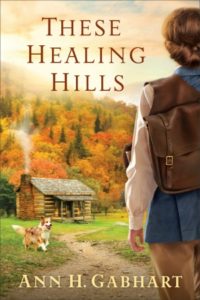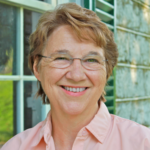Packed with history, These Healing Hills (Revell) by bestselling author Ann H. Gabhart introduces readers to the fascinating and difficult life of frontier nursing. When the soldier Francine Howard planned to marry after WWII writes to tell her he is in love with a woman in England, Francine is devastated and in need of a change. She seeks a fresh start in the Appalachian Mountains, training to be a nurse midwife for the Frontier Nursing Services. In this interview, Ann explains why she decided to write about the Frontier Nursing Service, how she was able to so vividly capture the Appalachian area, and the most interesting thing she learned while doing research for this book…
Tell us a little about These Healing Hills…
 Francine Howard’s life is turned upside down when the soldier she planned to marry after World War II writes to say he’s fallen in love with a woman in England. She needs a new direction. Already a nurse, she jumps at the chance to train as a midwife in the Frontier Nursing Service in the Appalachian Mountains. The recruiter promised Francine her own horse and dog along with adventure and the chance to serve people in need of health care. Life in the mountains is harder than Francine ever imagined, but at the same time the mountain views buoy her spirit, and the
Francine Howard’s life is turned upside down when the soldier she planned to marry after World War II writes to say he’s fallen in love with a woman in England. She needs a new direction. Already a nurse, she jumps at the chance to train as a midwife in the Frontier Nursing Service in the Appalachian Mountains. The recruiter promised Francine her own horse and dog along with adventure and the chance to serve people in need of health care. Life in the mountains is harder than Francine ever imagined, but at the same time the mountain views buoy her spirit, and the
mountain people touch her heart.
Ben Locke has spent many years in the army longing to once more breathe the mountain air of his home. At the same time, he knows a man has few opportunities in the mountains other than subsistence farming or coal mining. While neither appeals to him, he still wants to feel the mountains beneath his feet again. And then he meets Francine, someone from a completely different background, and things get even more complicated for him.
Ben and Francine must both find healing in the mountains as they move toward the future.
Why did you decide to write about the Frontier Nursing Service?
While poking about for a new idea for a story, I happened upon a book about Mary Breckinridge, the founder of the Frontier Nursing Service. She was a woman with a vision. After losing her two children at young ages, she wanted to make a difference in the health of mothers and children. So after much training and research on the best place for her health initiative, she established the Frontier Nursing Service in the Kentucky Appalachian Mountains where very little medical care was available in 1925.
At first, all the midwives were from England due to no midwife schools in America, but when WW II broke out in Europe, the English midwives felt compelled to return home to help with the war effort. So Breckinridge started her own Frontier Nursing School in the mountain town of Hyden, Kentucky, to train new midwives. She had always actively sought contributions to fund the Frontier Nursing Service, but now she and others also began recruiting applicants to the school.
The more I read about the women, who came to the program from easier lifestyles but were enchanted by the mountains, the more I wanted to let my character be one of these women. And then I liked getting to know the mountain people through my research. Great history, mountain settings, and strong characters all made a great jumping off place for me to start writing this story.
How did you so vividly capture the Appalachian area? Did you visit?
 I’m a lifelong Kentuckian and while I don’t live in the Appalachian area, I’m very familiar with that part of Kentucky. I have often visited the state parks in the mountains and have read many stories set in Appalachia. I did visit Wendover, Mary Breckinridge’s home in the mountains that was designated a National Historical Landmark in 1991. It’s a bed and breakfast now where people can visit and learn more about the history of the Frontier Nursing Service and the beauty of the mountains.
I’m a lifelong Kentuckian and while I don’t live in the Appalachian area, I’m very familiar with that part of Kentucky. I have often visited the state parks in the mountains and have read many stories set in Appalachia. I did visit Wendover, Mary Breckinridge’s home in the mountains that was designated a National Historical Landmark in 1991. It’s a bed and breakfast now where people can visit and learn more about the history of the Frontier Nursing Service and the beauty of the mountains.
The Frontier Nursing School is still actively training students in nearby Hyden, Kentucky. A book by James Still, The Wolfpen Notebooks, that I bought at a book fair many years ago was very useful in helping me capture a little of the mountain speak. It also helps that I grew up on a farm, and although it wasn’t in the mountains, farm folks everywhere have some similar ways and a like respect and love for the land.
What was the most interesting thing you learned while doing research for this book?
The firsthand experiences of the nurse/midwives as they treated their patients were eye-opening for me. I admired their dedication in fording flooded rivers and riding horses along icy trails and through snowstorms—or whatever obstacles nature threw at them—in order to reach the homes of their patients. I also liked the family feel of the Nursing Service and how the nurses respected the mountain people in spite of their different ways.
Then it was inspiring to think about the difference one determined woman with a vision made in the lives of so many. From the FNS beginnings in 1925 to 1975, the FNS nurse/midwives recorded delivering 17,053 babies with only 11 maternal deaths. That is an amazing statistic in an area that Mrs. Breckinridge chose for her service because of the high childbirth mortality rates.
Do you relate to Francine in any way?
I’m certainly no nurse. I do love a mountain vista, and Francine fell in love with the mountains too. I never think I base my characters on me in any way. My characters come to my stories as separate people with stories to share. That said, I’m sure my personality or feelings do sneak into my characters from time to time. Oh, and with Francine, there is how she loves her dog, Sarge. I’ve loved dogs ever since I begged my parents to let me have a dog when I was eight or nine.
What lesson(s) do you hope readers will take away from reading your book?
I don’t set out to write a story full of lessons. I write to share stories with readers. If they are introduced to interesting history or fascinating places or perhaps new ways to think or feel, that’s a bonus. I hope following along the story trail with my characters will encourage them in their own walks through life.
Perhaps in this story, These Healing Hills, a reader might understand how the Lord continues to work in our lives even when things aren’t going the way we think they should. As Francine’s grandmother tells her, where one door closes another opens. Or if not a door, a window somewhere. Sometimes blessings await us on the far side of disappointments.
And then I want readers to feel that rhythm of nature Granny Em tries to get Francine to notice in the mountains.
In what way would you say your faith is worked into the book?
My faith is an integral part of my life and my worldview. Not that I don’t stumble at times and have questions. Some of my characters are that way too with a sure belief even when they are challenged by life happenings. Other characters are exploring what they believe and either finding faith or strengthening their wavering faith. We are all on different life paths.
I feel blessed when I’m writing and a bit of a Bible verse or a Bible story comes to mind that perfectly fits my character’s situation. I try not to be preachy in my stories, but I do like weaving faith threads through the story in a way that seems a natural part of the characters’ lives.


